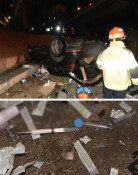Casseurs, Frances Protest Mobsters
Casseurs, Frances Protest Mobsters
Posted June. 28, 2008 08:34,
France calls those who vandalize facilities casseurs, or destroyer in English. French law enforcement authorities separate casseurs from peaceful protesters and mete out severe punishment.
When the streets fall into disorder due to demonstrations, casseurs, in the midst of demonstrators, damage buildings and break car windows.
In most cases, it is casseurs who clash with the CRS, Frances riot police. Those vandals, who mostly appear at scenes where labor unions and college students stage rallies, mostly consist of young Muslims living on the outskirts of big cities and white middle-class teenagers who act on impulse.
Casseurs began making their presence felt in the 2000s, and became troublemakers in 2006 when students and labor union members took to the streets in protest against the first employment contract (CPE, an employment contract that allows employers to dismiss new employees for an initial period of two years). At the time, it was the opposition Socialist Party and the nationwide parents association (FCPE) who railed against police for failing to crack down on casseurs. They were angered that the noble cause of the protesters was being undermined by reckless vandals.
Then Interior Minister Nicolas Sarkozy, the incumbent France president, declared a no tolerance policy against casseurs. From that point on police started to do their utmost to arrest casseurs, who are not easily distinguished from ordinary demonstrators. Police officers even disguised themselves as protestors to ferret them out.
Casseurs paint themselves as revolutionists advocating nihilism, anarchism, or other ideologies that reject the establishment. However, they have no interest in what protesters pursue and only vent their frustration and anger stemming from a sense of estrangement.
Reporters are often attacked by casseurs while covering rallies. They believe reporters who take pictures of them, help police determine their identities.
Even though the French authorities are generous about demonstrations, which have become almost a daily routine, they sternly deal with illegal protests. Indoor rallies are allowed until 11 p.m. and outdoor rallies require the governments permission.
The French government gives permission on the condition that protest organizers appoint their own officials in charge of keeping public order and rallies end before sunset. When protesters dont comply with police control, they are punished regardless of their social positions. French law enforcements stern reaction to unlawful protests is well demonstrated by TV footage in April where a lawmaker of the Green Party, who obstructed an Olympic torch relay, was being dragged with his arms folded behind his back by police.
pisong@donga.com







